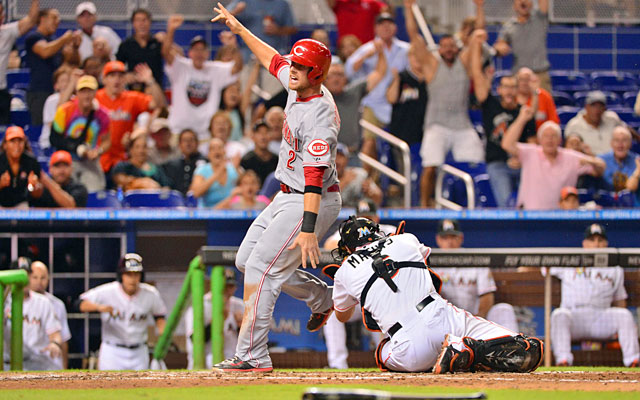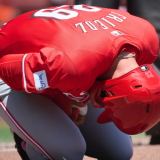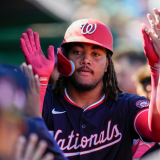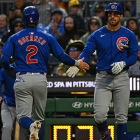
More MLB: Power Rankings | Expert Picks | Latest news & notes | Fantasy news
During the eighth inning of Thursday night's Reds-Marlins game (CIN 3, MIA 1), Todd Frazier flew into what was initially called an inning-ending double play with the bases loaded and one out. Giancarlo Stanton caught the soft line drive in right and fired home to get Zack Cozart, who tagged up from third and tried to score.
The throw took catcher Jeff Mathis into Cozart's lane, though the throw beat him by several steps. The new home plate collision rule says a catcher is allowed to block the plate as long as he has the ball, which Mathis clearly did before Cozart got there. Furthermore, MLB has said the catcher can be in the lane if the throw takes him there.
Home plate umpire Mike Winters correctly called Cozart out at the plate, though the umpires got together to call the league's central office in New York for confirmation. It was not a manager's challenge, the umps made the call on their own. After more than a six-minute review, the call was overturned and Cozart was allowed to score because Mathis was deemed to have been blocking the plate illegally. Here's the play:
Needless to say, Marlins manager Mike Redmond was irate and eventually ejected after arguing. The call that should have ended the eighth inning with Miami's 1-0 lead intact was reversed and the game was tied at 1-1. Ryan Ludwick followed with a two-run single to center later in the inning, given the Reds a 3-1 lead. They won the game by that score.
After the game, Marlins president David Samson told MLB.com's Joe Frisaro the ruling was a "travesty" and said "there is absolutely zero excuse" for the call to be overturned, and he's right. Mathis did everything properly.
MLB released the following statement after the game:
"We have begun to examine the Crew Chief Review in tonight's Reds-Marlins game, which resulted in a violation of Rule 7.13, the call being overturned and a run scoring on the play. We plan to discuss this situation further with the appropriate parties tomorrow, and we will communicate with the Clubs after our discussion about this play."
The league has been quick to make adjustments to the new blocking rules this year, but I'm not sure what they could change after this. They're not going to eliminate the rule and make the game less safe. This is all on the New York crew making a mistake during the review. Winters, the home plate ump, nailed the initial call. He got it exactly right. The review crew screwed up.
Who knows what would have happened had the initial call been upheld. The Marlins might have wound up losing the game anyway. But they were robbed in that eighth inning and a hugely important out was stolen from them. They have every right to be upset and MLB is doing the right thing by reviewing the ruling.
Update: MLB issued the following statement after reviewing the play and the overturned call:
The Replay Official judged that the catcher did not provide a lane to the runner and hindered his path to the plate without possession of the ball. The throw also did not force the catcher into the runner's pathway. As a result, in accordance with Rule 7.13, the ruling on the field was overturned and the run was allowed to score.
We realize that people may reasonably have different opinions regarding the application of Rule 7.13 in any particular instance because it is a judgment call. We are continuously evaluating the application of the new rule, and we anticipate a full review with all appropriate parties in the off-season in order to determine whether any changes should be made. We also recognize that the exorbitant length of last night’s review, which was more than three times the season average, must be avoided in the future.
That said, the most important goal of this rule has been to eliminate dangerous collisions at home plate, and it cannot be disputed that the rule has been very effective toward achieving this purpose.
So, long story short, they stand behind the replay umpire and are more upset about the length of the review. Something tells me the Marlins won't be pleased with that explanation.





















